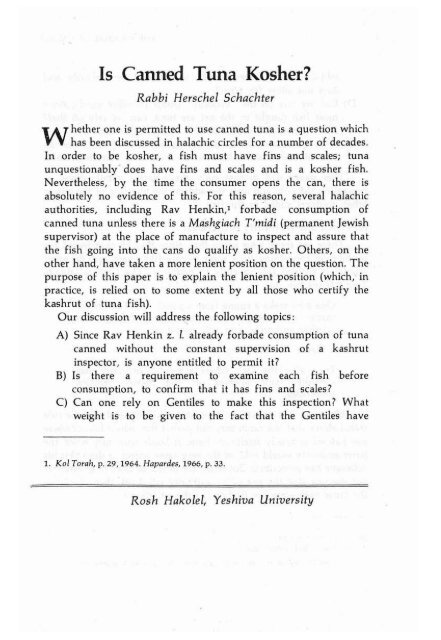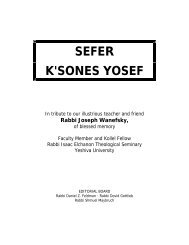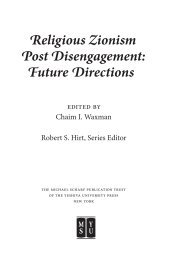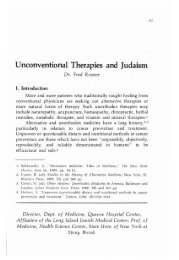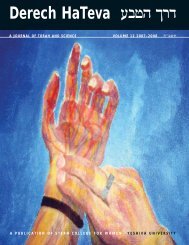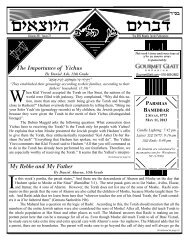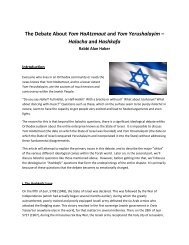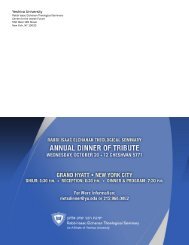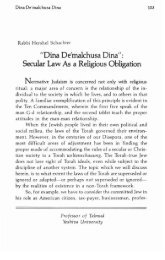Volume 15 - RJJ Journal of Halacha and ... - YU Torah Online
Volume 15 - RJJ Journal of Halacha and ... - YU Torah Online
Volume 15 - RJJ Journal of Halacha and ... - YU Torah Online
- No tags were found...
Create successful ePaper yourself
Turn your PDF publications into a flip-book with our unique Google optimized e-Paper software.
WIs Canned Tuna Kosher?Rabbi Herschel Schachterhether one is permitted to use canned tuna is a question whichhas been discussed in halachic circles for a number <strong>of</strong> decades.In order to be kosher, a fish must have fins <strong>and</strong> scales; tunaunquestionably does have fins <strong>and</strong> scales <strong>and</strong> is a kosher fish.Nevertheless, by the time the consumer opens the can, there isabsolutely no evidence <strong>of</strong> thiS. For this re~son, several halachicauthorities, including Rav Henkin,' forbade consumption <strong>of</strong>canned tuna unless there is a Mashgiach T'midi (permanent Jewishsupervisor) at the place <strong>of</strong> manufacture to inspect <strong>and</strong> assure thatthe fish going into the cans do qualify as kosher. Others, on theother h<strong>and</strong>, have taken a more lenient position on the question. Thepurpose <strong>of</strong> this paper is to explain the lenient position (which, inpractice, is relied on to some extent by all those who certify thekashrut <strong>of</strong> tuna fish).Our discussion will address the following topics:A) Since Rav Henkin z. I. already forbade consumption <strong>of</strong> tunacanned without the constant supervision <strong>of</strong> a kashrutinspector, is anyone entitled to permit it?B) Is there a requirement to examine each fish beforeconsumption, to confirm that it has fins <strong>and</strong> scales?C) Can one rely on Gentiles to make this inspection? Whatweight is to be given to the fact that the Gentiles haveL Kol To,ah, p. 29, 1964. HapQ,des, 1966, p. 33.Rosh Hakolel, Yeshiva University
•THE JOURNAL OF HALACHAesbtablished a system which is followed meticulously <strong>and</strong>does not allow for error?D) Can we rely on the "majority" (rav)? In other words. sincemost fish caught in the net are tuna, can we rely on that?Does it matter how much <strong>of</strong> a "majority" exists?E) What questions arise in the processing <strong>of</strong> the fish? Does theissur <strong>of</strong> bishul akum have to be taken into consideration?This paper will discuss only the halachic ramifications <strong>of</strong>processing the fish, <strong>and</strong> does nol address the question <strong>of</strong> the oils orother products added to the fish.A. When one Authority proscribes:There are those who argue that, since Rav Henkin issued hisprohibition concerning tuna some twenty-five years ago, no otherscholar is entitled subsequently to permit it. The Gemara (AvodaZara 7a) teaches thatOne who seeks a ruling from a posek who forbids thematter in question, may not seek a ruling fromanother authority who will permit it.On this theme, the Shach rules 2Even after theconsulted <strong>and</strong>proscribed.fact, where aallowed it,second authority wasthe matter remainsHowever, it is extremely important to underst<strong>and</strong> that the rulestated above that one rabbi may not permit that which his colleaguehas banned is totally irrelevant here. It holds true only when thelatter authority would rule on the very same object or deed that hiscolleague has proscribed. But when the object or deed in question' isnot the one that the preceding authority ruled on, then <strong>of</strong> coursethe latter may state his finding on the situation.)2. Yoreh De4h 242.543. See Ramo, ibid, citing Maharik:...but in any other case, who can make the erronl'(lUS statement
CANNED TUNA,Obviously, the cans that Rav Henkin, z, I., banned no longerexist <strong>and</strong> are not the cans presently in question.Secondly, let us note that the lenient view on this matter doesnot originate from myself but is a ruling received from our teacher,Rav Yosef Dov Soloveitchik, who takes the lenient view in thismatier. 4 Similarly, it is known that Hagaon Rav Aharon Kotler, z.I., ruled that one may eat Bumble Bee tuna (which at that time hadno rabbinic supervision whatsoever). Many other halachicauthorities took a similar position regarding canned tuna. I wouldtherefore like to clarify this opinion, held by my teacher, RabbiSoloveitchik, <strong>and</strong> all those who concurred with his ruling.B. Characteristics <strong>of</strong> Kosher FishRepeated examination <strong>of</strong> tuna has ascertained that it has fins<strong>and</strong> scales <strong>and</strong> is therefore a kosher fish. The rule concerning fish isunlike that <strong>of</strong> 'birds, whose kosher status is restricted to those birdsconcerning which the Jewish community has a tradition <strong>of</strong> kashrut. 5Many years ago, an objection was raised concerning onethat the second pasek may not allow it? If so, when a cnachilltlerrs in ruling on any issue, the error will remain for all time, forno authority will be empowered to rule othuwise, Another thing:halachic literature is replete with references to Rashi whoenlightened [srael <strong>and</strong> on whose wisdom the world st<strong>and</strong>s.Nevertheless there are many instances where Rashi prohibits <strong>and</strong>Rabbenu Tam, his gr<strong>and</strong>son, rules leniently.4. Rabbi Soloveitchik forcefully reiterated this position <strong>and</strong> was publicly heard 10de
10 THE JOURNAL OF HAlACHAvariety <strong>of</strong> tuna, the skip jack, which is lacking scales on its tail.near the fins, <strong>and</strong> near the jaw. Now, the Ramo (Yoreh Deah 83, 1,)specifically recommends that we be strict regarding finding scales injust these places. However, the Kaf Hachayim (ibid., no. 3) bringsthe view <strong>of</strong> Prj Megadim <strong>and</strong> other poskim thai this strict position<strong>of</strong> the Ramo refers only to a fish which has but one scale, the fearbeing that somehow this scale is not really from the fish itself butbecame attached by accident. In such a case, we must check thelocation, to be sure that at least the scale is in the strategic place.But when a fish has many scales, it is <strong>of</strong> no consequence on whichpart <strong>of</strong> the body they appear.In fact, the skip jack tuna has numerous scales on its body.Many years ago, Rav Soloveitchik was shown this fish <strong>and</strong>, afterpersonally checking its scales, declared it to be kosher.C. Must fish be examined to assure Kashrut?There are those who would han canned tuna on the groundsthat no fish is deemed to be kosher unless the existence <strong>of</strong> fins <strong>and</strong>scales has been ascertained by direct examination. Since thefisheries in Puerto Rico, where the fish are processed, have no Jewspresent to check each fish individually for these characteristics, thetask being performed by the non-Jewish workers, one could arguethat there is no basis for regarding the processed fish as kosher.This rationale is obviously incorrect, however, for we rule that... where it {the fish) is currently devoid <strong>of</strong> them[fins <strong>and</strong> scales] <strong>and</strong> will eventually grow them, itmay be eaten. (Avoda Zara 39a)Clearly, it is impossible to examine fins <strong>and</strong> scales that are not yetin existence. How then does the Gemara permit the consumption <strong>of</strong>this fish? We must conclude that the need to ascertain the existence<strong>of</strong> fins <strong>and</strong> scales is merely a prerequisite for establishing thekashrut <strong>of</strong> a fish species. Once this has been done <strong>and</strong> we recognizea fish as belonging to such a species it is kosher despite the fact that
CANNED TUNA"the particular fish in question itself has never been examined forthese characteristics.6,1Still, even though each fish need nol be examined as long aswe know that it belongs 10 a kosher species, Ihe question arises thaicanned tuna is a tolal unknown to us, for all traces <strong>of</strong> fins <strong>and</strong>scales have been removed along with the skin. How can we be surethat the can contains tuna? Can we rely on the inspection <strong>of</strong> theGentile factory workers in Puerto Rico? We know that thetestimony <strong>of</strong> a non-Jew in kashrut matters is generally not accepted.Let us, however, consider the question from a different vantagepoint.D. No craftsman willingly jeopardizes his livelihood.It is a wel1~established halachic principle that although we maynot rely on the evidence <strong>of</strong> a non-Jew relevant to the kashrut <strong>of</strong> afood item, yet if can be certain that he is telling the truth, in certaincases we may rely on him. Jewish law operates on the principle thatevery individual, including the non-Jew, is concerned withmaintaining his reputation as a reliable craftsman or worker; it isnot worth it to him to endanger his livelihood by selling an object6. See D",rkei Ttshuvah 83: he notes that according to Minchal Chin",h(Mitzvah <strong>15</strong>4). one who ate a fish <strong>and</strong> examined it only for the presence <strong>of</strong>fins but did not search for scales, has violated the precept <strong>of</strong> inspecting a fishfor its kosher traits. Darkei Tnhuvllh, however, comments that this appliesonly to a fish which is not recognizable to us as being <strong>of</strong> a kosher species.But if we discern that it is <strong>of</strong> a kosher species, then all concur that it isunnecessary to check it for kosher characteristics on every occasion.Darkei Telh"vllh 79 reiterates this position when dissenting from SeferHIlCltinuclt (Mitzvah <strong>15</strong>3), who states that it is a positive precept to e::
THE JOURNAL OF HALACHAunder false circumstances since thereby he can ruin his entirereputation <strong>and</strong> business,This principle is clearly pertinent to our discussion.The Gentile fishermen on the fishing boats meticulously seekto limit their catch not only to tuna but to those specific tunaknown as albacore <strong>and</strong> skip jack. They do this because the'canneries will not buy any other type <strong>of</strong> fish from them, nor anyother kind <strong>of</strong> tuna other than the two species enumerated. Thecanneries are not motivated here by considerations <strong>of</strong> kashrut, forall species <strong>of</strong> tuna are kosher. They have more pragmatic concernsin mind. The canneries are set up to process these two species <strong>of</strong>luna with maximum efficiency; they are therefore unwilling to takein any other type <strong>of</strong> tuna. For purposes <strong>of</strong> quality control, they willnot permit the introduction <strong>of</strong> albacore whose appearance differsfrom the rest.Thus, while it is true that a heathen may not bear witness inquestion <strong>of</strong> kashrut, nevertheless, we may rely on these Gentilefishermen to verify the kashrut <strong>of</strong> the fish, not as witnesses, but asa simple truth <strong>of</strong> human nature. An artisan will not do anything tojeopardize his means <strong>of</strong> livelihood, They are always careful to usenets especially made to catch these types <strong>of</strong> fish. They examine thefish when the catch is made. Whatever they cannot sell to thecannery they throw back into the ocean to make more room on theboat for the saleable fish. The fishermen examine their catch onceMoreh Nevllchim that Ihe kosher traits identify the fish as belonging to akosher species.While Ramban (in his commentary to <strong>Torah</strong>) views the kosher traits asprerequisites for establishing the kashrul <strong>of</strong> each fish, ehatam Safer refers toa question raised by a correspondent: Our rule is that if a fish will eventuallygrow the fins <strong>and</strong> scales it is deemed kosher, even prior to the growth <strong>of</strong> thekosher characteristi(5. How can Ramban say that fins <strong>and</strong> scales arepre'eqllisiles to kashrut? Refer there for his resolution <strong>of</strong> Ihis problem(Chllillm 5o~r, Yoreh Dellh 75).At any rate, no matter how we resolve Ramban, Dllrkei TeshllV/lh'sprinciple remains evident, viz., Ihal it is impossible to consider the inspe
CANNED TUNA13again on shore prior to its sale. The buyers examine the fish beforepurchase to assure that the fish is the type necessary forproduction. They check once again prior to processing in thecannery.We must emphasize that motivation for their fastidiousness isnot fear <strong>of</strong> exposure <strong>and</strong> ensuing penalties, so that the argumentmight be made that where pr<strong>of</strong>its far exceed penalties, they wouldtake the risk <strong>of</strong> using non-kosher fish. Rather, their procedures aredesigned specifically for two types <strong>of</strong> tuna <strong>and</strong> it is in their owninterest to assure that no other fish enters their machinery. Inaddition anyone who has ever visited the canneries is aware <strong>of</strong> themeticulousness with which the workers eliminate any unkosherspecies because their presence has a detrimental effect on the other,kos,her fish.aE. The Power <strong>of</strong> "Majority" (rov).Despite the great care taken to assure that only albacore <strong>and</strong>skip jack enter the tuna cannery, we must admit <strong>of</strong> the possibility,however remote, <strong>of</strong> some other fish becoming mingled with thecatch <strong>and</strong> inadvertently being processed with the kosher fish. Can8. See ¥abiR Omtr (volume 5, ¥o,eh Deah 9) who concurs with those who relyon the certainty that a craftsman will not jeopardize his livelihood, to establishthe status <strong>of</strong> the oil (that the Fish is packed in) as kosher <strong>and</strong> contains no oilfrom a non-kosher species <strong>of</strong> fish (ibid, 4), while rejecting this very samerationale for identifying the species <strong>of</strong> fish itself (ibid, 3). The distinction isdifficult to underst<strong>and</strong>. for the Gemara in Avoda Zara 34b statts specificallyth..t one may rely on this law <strong>of</strong> human nature to identify a fish ..s kosher.No mashgiach has ever found any nonkosher fish in a nnnery. In fact, theyhave never Found in the F..clory any other species <strong>of</strong> tuna other than albacore,skip jack. or yellow fin. This case is similar to the case in the Talmud wherewe rely on the certainly that .. craftsman will do nothing to jeopardize hislivelihood. We are forced to conclude that the author <strong>of</strong> ¥abia Orner isreferring to .. situ..tion where this consideration is non-existent, where pr<strong>of</strong>itma>timiution is 3,hieved without segregating one particular species. But wherebusiness concerns dictate that only one species <strong>of</strong> fish be processed, thenreliance on the above rule <strong>of</strong> behavior is beyond dispute. We know it to betrue after m,ny yurs <strong>of</strong> having mashgichim visit the factories ..ndsubstantiate the fa,ts as we h,ve stated.
THE JOURNAL OF HAlACHAwe nevertheless claim that each can <strong>of</strong> tuna may be assumed tocontain only kosher fish, based on the principle that since theoverwhelming majority <strong>of</strong> the fish are kosher, each can is entitled tothe presumption that it belongs to this "majority" (rov)? Whilelogically this is an atlractive <strong>and</strong> compelling· position, <strong>and</strong> we willdiscuss it below more fully, we do have to consider the trenchantargument <strong>of</strong> Rivash (Responsum 192) that since the <strong>Torah</strong>specifically instructs us to determine kashrut <strong>of</strong> fish via physicalinspec!ion <strong>of</strong> (ins <strong>and</strong> scales, this establishes an obligation toexamine each fish individually <strong>and</strong> precludes our attributing it toone <strong>of</strong> the prevailing species without pro<strong>of</strong>. However, as we shallsee in the discussion <strong>of</strong> "prevailing probability" below, even Rivashwould concur with a lenient position where the possibility <strong>of</strong>finding an unkosher fish mixed in is so very remote.F. Different types <strong>of</strong> prevailing probabilities (rov):Since in actual practice we are relying on the presumption thatalmost all fish being processed in the tuna canneries are tuna <strong>and</strong>therefore we may assume that the can contains only tuna, we mustexamin"e the halachic legitimacy <strong>of</strong> such a position. Does Jewish lawpermit our acting on the strength <strong>of</strong> a logical assumption, absentactual physical inspection?It is clear from the Gemara that there are various cate·gories <strong>of</strong>"prevailing probabilities" (rov):1. A slim majority such as where there is only about a 51%chance <strong>of</strong> one probability over its alternative. In this case,where a "thin" probability is pitied against a status quosituation (chazakah), the two are considered to be equallyweighted (Tosafot, Avoda Zara 41b). The reason thatprevalent probability normally outweighs the status quo rule isthat the former serves to indicate what the facts <strong>of</strong> thesituation are while the "status quo" merely asserts a rule <strong>of</strong>conduct to be followed <strong>and</strong> can not ascertain the facts. But weonly accept the "prevalence" as a logical necessity where"prevalence" is strong. But where the majority forces involvedjust barely outweigh the opposing probability (such as a
CANNED TUNAISmajority <strong>of</strong> 51%), it is considered no better than a mode <strong>of</strong>behavior, (chazakah) <strong>and</strong> both sides <strong>of</strong> the case are given equalweight.II. A strong "prevailing probability" (such as where there is a70% or 80% probability factor).9III. An overwhelming majority, which renders the alternativeremote (such as a probability factor <strong>of</strong> 90%). The distinctionbetween II <strong>and</strong> III above may be found in Chidushei Ramban<strong>and</strong> in Mi1chamot to the first perek <strong>of</strong> Chu/in; it is l;;ited as.being the rule in Yoreh Deah. (39:1) <strong>and</strong> Shach, (ibid, no. 2):Wherever direct examination can clarify the situation, thesemeans should be employed <strong>and</strong> we may noi attribute thefacts to the "prevailing probabilities" when they are <strong>of</strong>category n. But when category III is what we have, thenexamination is unnecessary.IV. Topping the list is a prevailing probability <strong>of</strong> suchpredominance that the alternative is one in a thous<strong>and</strong>. Insuch a case, Chatam S<strong>of</strong>er lays down the principle 10 that thisfactor is 50 negligible that normal people do not reckon withit at all. In such a case we conclude that "C-d watches overfools," i.e., the danger is so minimal that doing it violates noprecepts. IIClearly, a probability <strong>of</strong> one in a thous<strong>and</strong> is considered sonegligible as to be non~existent, <strong>and</strong> thus absolves us from theprecept <strong>of</strong> examining the fins <strong>and</strong> scales <strong>of</strong> each fish individually.12See responsa Har Zvi YD.: 74 who discusses a lenient reading9. 5e-e Tosafot Kiddushi01 BOa s.v. Smoch Miurah L'Cha~akah.10. Respo01SQ Chat~m s<strong>of</strong>er, Yoreh Deah 338, dtPd in Pirchei Teshuvah YotehDeah 357,1.11. Charum S<strong>of</strong>er's principle contradicts that <strong>of</strong> Mahanm Schick (Yoreh Deuh244) who writ~s regarding the contemporary need for met~irUl"Even when prevailing mPdic,,1 knowlPdge tells us that the risk tothe child i\ one in a billion we may violate the Sabbath for thechild.Most authOTiti~12. See Responsa <strong>of</strong> Rivash who says this explidtly'concur wilh Chalam s<strong>of</strong>er.
16 THE JOURNAL OF HALACHA<strong>of</strong> Rivash in the context <strong>of</strong> his own lenient ruling.The first two reasons he adduces for his position also apply tothe subject under discussion:A) Where the unkosher species is never to be found, even Rivashhimself concurs that we rely on the prevailing probability (ascited in note 12, regarding the bearded vulture <strong>and</strong> theosprey).B) Rivash's intent was to indicate that we should not rely on theprevailing probability in a situation where the <strong>Torah</strong>specifically directs "You shall segregate," which it does inconnection with the examination <strong>of</strong> birds. This shows thatinspection <strong>of</strong> birds is a positive precept.;.Consequently,wherever the possibility <strong>of</strong> inspecting the cre.}ture exists, oneis obliged to check <strong>and</strong> segregate the unkosher birds.(Rivashimplies the same in Responsum 191); but where examinationis completely impossible, then we rely on probability. Thesame logic employed by the author <strong>of</strong> Har zf![ in the case <strong>of</strong>birds applies as well to the tuna situation.H. The Ban on Chilek <strong>and</strong> Rashi's Opinion:There is another theoretical basis for issuing a ban on consumption<strong>of</strong> canned tuna. In Avoda Zara 35b the Mishnah states:"The following are items <strong>of</strong> non-Jews which are forbidden ... <strong>and</strong>chilek." Discussing this on p.39a, the Gemara explains, "Why isSince the <strong>Torah</strong> comm<strong>and</strong>ed us to examine the characteristia; <strong>of</strong>each bird to ascertain that it is not one the 24 nonkO!iherspecies... we must therefore be alert for any <strong>of</strong> the 24 specieseven though each constitutes a small minority except for thebearded vulture <strong>and</strong> the osprey which are completely absent frominhabited areas. as Ramban states: "They are found only indeserts <strong>and</strong> extremely remote isl<strong>and</strong>s at the edge <strong>of</strong> civilization."But where the possibility <strong>of</strong> their appearance exists. then eachbird is susped. as we say by animals "he must be capable <strong>of</strong>recognizing a wild ass," despite the fact that the wild assrepresents an insignificant percentage <strong>of</strong> the total kosher animalpopulation.
CANNED TUNAdistinguishing the kosher chilek from nonkosher fish <strong>and</strong> theTalmud specifically permits them to be eaten:"Chilek belonging to an expert [non-Jew] may beeaten... (Avoda Zara 39).The realities <strong>of</strong> the tuna industry conform to these guidelines.For their own financial interests fish processors repeatedly examinethe fish intake <strong>of</strong> the cannery 10 assure that they are processingonly albacore tuna which conforms 10 the appearance <strong>of</strong> st<strong>and</strong>ardalbacore, as explained above.Moreover, the Mishnah is referring to a case where we an~certain that small unkosher fish are netted along with the kosherfish. It is only here that Rashi maintains the rabbis banned theentire conglomeration even if the kosher species is a thous<strong>and</strong>foldmore numerous than the nonkosher one. But in our case, there is nocertainty at all that Ihe unkosher species is present in the cannery.On the contrary, the fishermen, the factory workers <strong>and</strong> the factoryowners meticulously seek to package only albacore matching Iheindustry-wide st<strong>and</strong>ards. Consequently, it is erroneous to drawconclusions about the halachic status <strong>of</strong> tuna based on theprecedent <strong>of</strong> the chiIek ban.1. The problem <strong>of</strong> Bishul AkumPerhaps the tuna should be forbidden because it is cooked in thefactory by Gentile workers, thus making it bishul akurn? MinchatYitzchak (3:26:6) rules leniently, based on two considerations: Thetuna is cooked in the factory by a work force whose identity isunknown t9 the consumer. (Editor's note: the reason for the rabbinicedict forbidding consumption <strong>of</strong> food cooked by a non-Jew is todiscourage social intercourse, which could lead to intermarriage - anunlikely result when the cook <strong>and</strong> the consumer remain unknown toeach other). He also notes that the fish is not actually cooked butrather steamed; some latter-day halachic authorities hold that"steaming" is equivalent to "smoking" which is not included in theban on bishul akurn (Darkei Teshuvah: 14). Rabbi Ovadiah Yosef H
THE JOURNAL OF HALACHAconsiders canned fish permissible for the second reason alone <strong>and</strong>omits the first reason. However, his discussion applies only tosardines, for he was told by experts knowledgeable in the methods <strong>of</strong>processing sardines that prior to their being cooked in cans they aresteamed, cooking them slighty until they are fit to be eaten. Thus theyare not included in the edict <strong>of</strong> Bishul Akum, for they were alreadyrendered fit for consumption by the steaming process, prior to beingcooked in the cans. But tuna, which is cooked in cans in hot waterwithout any prior steaming, according to him may not be eaten. I 'However, other rabbis dissenl'6 <strong>and</strong> do permit the use <strong>of</strong> canned tuna;the rationale is not that in factory production the customer nevermeets the cook, but rather that steaming is considered equivalent tosmoking.Apparently the cooking process varies from place to place.Reliable mashgichim (Kashrut supervisors) report that the tuna soldhere in America is already edible after the first steaming. Relianceon this rationale is a basis for being lenient concerning this ban.l'14. Responsa Yubit:r Orner 5. Yoreh Oeuh 9.<strong>15</strong>. See Shevet Hlllevi 6, 108,6 who writes that currently the manner in whichsardines are processed has been changed.The-y are no longer salted prior to being prepued but Ire p];,.cedin cans containing oil <strong>and</strong> are steamed after the cans are se,led.shut. The steam causes the oil to boil <strong>and</strong> the sardines Ire thuscooked in the oil. Therefore, the sardines should be included inthe ban on Bishwl Akwm... Those who rule leniently rely on theprinciple stated in some sefllrim that the cooking done in afaCIQry where the food is thus being prepared for tens <strong>of</strong>thous<strong>and</strong>s <strong>of</strong> people is not included in the ban <strong>of</strong> bishwl Ilkwm,where the intent was to discourage intermarriage. However, Iheard directly from the Chuon ish, d. that we should bestringent in this maUer."16. See Beit Avi J,1<strong>15</strong>.17. See te'lt <strong>of</strong> Yubiu Orne, J <strong>and</strong> Minchlll Yitzch..k 4,81. See also shabhllf 5lathat the law may be different for a "prominent person," Note the discussionsin shevtt Levi J, Minchlll Chinwch, sh..ch, (Ibid. <strong>15</strong>2). responsa Divrei Youf,Arwch Hushwlchun, <strong>and</strong> T0511fot to Sh"bb", 51; Chlllllm s<strong>of</strong>er ResponsaOr..ch Chuim <strong>15</strong>.
CANNED TUNA21J. When the Flavor <strong>of</strong> Forbidden Foods is AbsorbedOne more issue must be considered: when the cans are filledwith fish to be brought in to the steam room, they are placed onplastic carts. Although the mashgichim in the factories are diligentto see that nonkosher fish are not cooked in the same steamingroom with the kosher fish, sometimes the same carts that previouslyserved for cans containing nonkosher fish (such as cat-fish) may byused, (within 24 hours) for cans <strong>of</strong> tuna. Perhaps there isjustification for concern that the flavor <strong>of</strong> the nonkosher fish willpass from the hot cans into the cart, <strong>and</strong> later, in a reversal <strong>of</strong> thisprocess, from the carts into the kosher tuna while it is beingsteamed?Chemists maintain that it it is impossible for flavor to passeither through a can to the cart or, conversely, to go from the cart<strong>and</strong> infiltrate a can. If they are correct, then further discussion ispointless. However, let us proceed on the assumption that theirconclUsions are not completely verified. Jewish law considers thatflavor from nonkosher food which passes into kosher food canrender it nonkosher.u But when the kosher substance is abundant<strong>and</strong> when the amount <strong>of</strong> steam in the room exceeds the amount <strong>of</strong>forbidden flavor that the carts could possibly have absorbed by farmore than a sixty-to-one ratio, then the absorbed flavors cannotrender the food nonkosher. Nor need we be concerned thatsometimes the steam will not be sixtyfold more, for this is just nothow it is processed.The Rashba l9 considers what happens when a small amount <strong>of</strong>unkosher flavor is absorbed into a vessel. However in our case, thefood is not cooked in the carts but in the cans <strong>and</strong> any non-kosherflavor absorbed by the carts would first have to pass through theabundant steam in the room before it could be absorbed by thecans. In this instance all authorities concur with Rashba's lenientruling, for the rabbis only banned the use <strong>of</strong> a vessel in this manner18. Pirch,i Tuhul!ll; 84: notes; NllChlat Zui at length.19. Shukh/ln Aruch, Yoreh Dellh 99, Responsa <strong>of</strong> Rashba.
THE JOURNAL OF HALACHA<strong>and</strong> did not issue their decree in a case like this.This distinction would also apply to explain the permissibility<strong>of</strong> using carts used within the past 24-hours for the processing <strong>of</strong>nonkosher fish. Normally it is rabbinically prohibited to use a nonkosherpot, even after 24 hours, to cook kosher food. But thisprohibition only applies to the pot in which the kosher food isactually being cooked. Here the cans are kosher. The carls do noldirectly contain the kosher food which is now being cooked.Therefore we assume that this rabbinical prohibition does notapply.I have previously written a lengthy essay clarifying variousrabbinic approaches to the subject <strong>of</strong> "flavor" <strong>and</strong> when il isconsidered the "essence." This subject is beyond the scope <strong>of</strong> thepresent essay.Let us review our conclusions:Tuna is a kosher fish. Albeit it is processed <strong>and</strong> canned bynon-Jews, we may rely on their very strong motivation <strong>and</strong> concernto market only the quality <strong>of</strong> fish which will assure them continuedeconomic viability. Furthermore, the chance <strong>of</strong> nonkosher fishgelling mixed in with the tuna is a statistically remote possibility, soobscure as to be halachically irrelevant. The ban which rabbisplaced on the consumption <strong>of</strong> kosher fish (chilek) mixed in withnonkosher ones applies only when the signs <strong>of</strong> kashrut are not asyet visible in the young fish, but does not apply after signs appear inthe mature fish. This ban has been shown to have no pertinence to theactualities <strong>of</strong> tuna productions. Nor are the strictures <strong>of</strong> bishul akumpertinent, according to many authorities. (However, the Sefardictradition is generally more strict in applying rules <strong>of</strong> bishul akum,<strong>and</strong> some Sefardic leaders have announced a ban for (heirconstituents on the consumption <strong>of</strong> tuna).Editor's Note: This essay was originally presented as a shiur byRabbi Schachter <strong>and</strong> appears in Hebrew in the current issue <strong>of</strong> OhrHamizrach.


